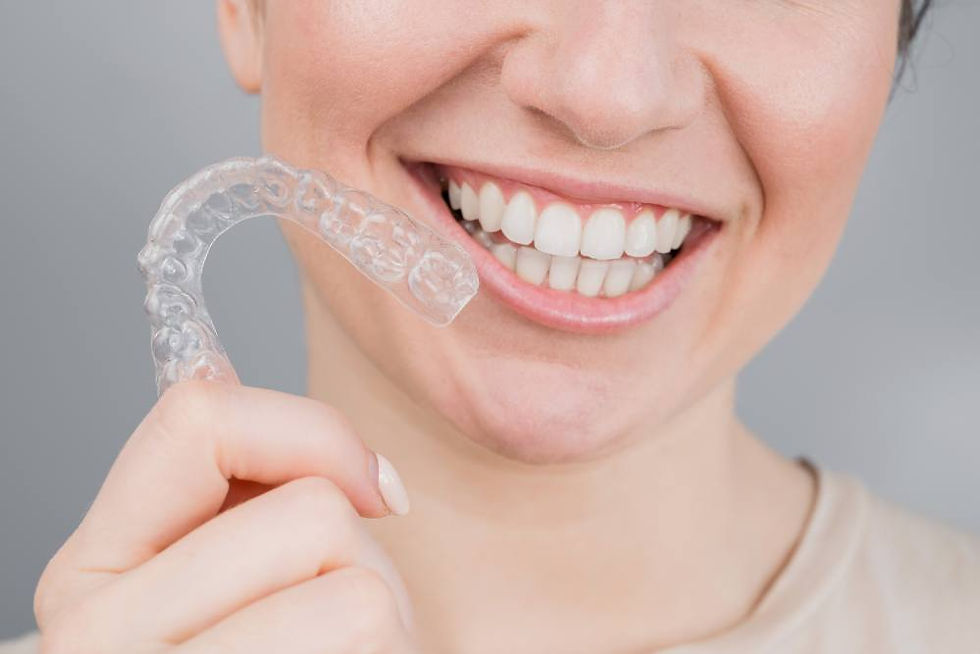Can You Whiten Veneers? Everything You Need To Know
- Thomas Baron
- Jun 15, 2025
- 3 min read

Porcelain veneers are designed to improve your smile by altering the color, shape, and size of your teeth. Crafted from tooth-colored materials, they bond to the front surfaces of teeth, producing a natural appearance.
Although veneers resist stains better than natural enamel, they can still discolor over time due to certain factors. Many patients ask, can you whiten veneers? Knowing the limits of whitening treatments on veneers helps maintain their appearance and make informed decisions about smile care.
Why Do Veneers Change Color Over Time?
Veneers do not stain as easily as natural teeth, but they can develop discoloration through surface stains. Drinks such as coffee, red wine, and tea contain pigments that gradually settle on the veneer surfaces. The longer exposure to these beverages, the more noticeable the stains become.
Gum recession may also impact the look of veneers. When gums recede, the junction where the veneer meets the natural tooth may become visible. This can reveal discoloration of the underlying tooth or bonding material and create dark lines or shadows near the gumline.
Older veneers, especially those made with less durable materials, may discolor more readily. Advances in porcelain technology have improved stain resistance, but veneers made decades ago might not have the same resilience.
Damage to the tooth beneath the veneer can also cause discoloration. If the dentin inside the tooth darkens, it can affect the veneer’s appearance despite the color of the outer shell.
Why Traditional Whitening Does Not Work on Veneers
Unlike natural teeth, veneers are made from porcelain or composite materials that do not react to bleaching agents. Whitening products target stains inside the enamel and dentin layers of natural teeth. Because veneers have a fixed, non-porous surface, bleaching gels have little to no effect.
Using whitening products on veneers may cause uneven coloring. Natural teeth might lighten while veneers stay the same shade, resulting in a mismatch. Patients should consult their dentist before trying any whitening treatments if they have veneers. At-home whitening can lead to dissatisfaction and potential damage to the veneer surface.
How to Maintain Bright Veneers
Although veneers cannot be whitened traditionally, patients can keep them bright by preventing stains and maintaining oral hygiene. Avoiding excessive consumption of highly pigmented foods and drinks reduces the chance of surface discoloration.
Brushing after meals removes pigments before they settle. Using a soft-bristled toothbrush avoids abrasion on the veneer surface. Regular flossing clears plaque and debris that could affect the gum area around veneers. Routine dental cleanings play a vital role in maintaining veneers. Professional polishings can eliminate superficial stains and restore shine without damaging the veneers.
When Replacement of Veneers Is Necessary
If veneers become discolored beyond cleaning or show signs of damage, replacement may be the best option. Veneers have a lifespan of around 10 to 20 years depending on care and materials used.
Your dentist can evaluate the condition of your veneers and recommend replacement if needed. New veneers offer an opportunity to refresh the smile with modern materials that resist staining better than older ones. Replacing veneers also allows correction of any changes in tooth alignment or gum recession that might have occurred since the original placement.
Other Cosmetic Options to Complement Veneers
For patients seeking to enhance their smile beyond veneers, cosmetic dentistry brings various treatments. Procedures like zoom dental whitening can brighten natural teeth around veneers and improve overall appearance.
In some cases, dental implants may be recommended to replace missing teeth and support the structure of the smile. Combining implants with veneers creates a comprehensive approach to dental aesthetics and function.
Consulting with a skilled cosmetic dentist helps develop a plan tailored to your smile goals and dental health needs.
When to See Your Dentist About Veneer Discoloration
If you notice your veneers becoming dull or stained despite regular care, a dental visit is advisable. Your dentist can assess whether professional cleaning will improve their appearance or if other treatments might help. Sometimes, what appears as veneer discoloration is actually staining or damage to the natural tooth or bonding material underneath.
Early diagnosis helps prevent further issues and keeps your smile looking its best. Do not hesitate to discuss your concerns during your routine dental checkup or schedule a visit specifically for veneer evaluation.
Maintain Your Smile with BrookHaven Dental Associates
BrookHaven Dental Associates offers compassionate, expert care to help you keep your veneers and natural teeth bright and healthy. We tailor treatments to your individual needs and guide you through cosmetic dentistry options and maintenance tips. From professional cleanings to advanced cosmetic procedures, our goal is to support your confidence in your smile.
Reach out today and take the next step toward a radiant, long-lasting smile with care you can rely on.




Comments